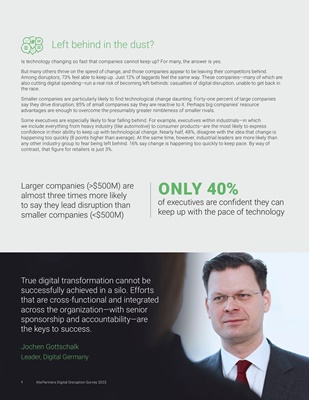
9
AlixPartners Disruption Index 2023
It is hard to imagine an industry that has been more disrupted and transformed by technology than retail. But the
retailers in our sample-just under a third of the total-appear to have less appetite for continuing digital investment
and, remarkably, are less likely to say that disruption is a threat than their peers in industrial, TMT, and other industries.
In the industry of Amazon, only 32% say business model transformation is a focus of their current digital investment;
that's less than half of what industrial and TMT leaders report. Retailers are twice as likely as others to say they are
reducing their digital investment; a surprising 71% are spending the same or less on technology as last year. Compared
to other industries, they are much more likely to count on their technology leaders to avoid outages and make sure
projects produce business results, but they are less focused on topline growth, less concerned about cybersecurity,
and less interested in AI-though the last of these could provide powerful tools for cross-selling and weapons against
shoplifting and reselling stolen goods.
When it comes to digital disruption, retailers may feel they are in a class by themselves: the first to be battered by
e-commerce, the worst hit from the pandemic, sideswiped by the supply chain disruptions that followed.
Industry leaders know that digital-first retail is their future. This means a shift in mindset for many retailers to an
online business that has stores and not a stores business with a website. Fifty-three percent of retailers say that it is
extremely or very important that their tech leaders have business operations expertise (vs. 38% for the sample as a
whole); by contrast, 29% say deep digital literacy is of great importance (vs. 43%).
Retail executives wants their tech leaders to be the most customer centric, listing customer-centricity among the top
skills for tech leaders half again as often as others do. But innovation excites them less. Across the sample, 29% say
that innovative, stretch thinking is the #1 attribute of a digital leader, but in retail, that drops by nearly a third, to 20%.
The overall picture retailers' responses paint is of an industry in defensive mode, waiting for a big idea. How vulnerable
are they, then, to a disruptive competitor who has one?
Something more than an experience curve seems to be
at work. The best-performing companies, about three out
of five in the sample, achieve a more consistent ROI from
digital investments and notably higher profit margins:
5.6% vs. 2.9%. As we will see below, leading companies
execute better on their digital projects, which helps explain
their higher profit margins. They also are aiming to move
beyond optimization of discrete processes and siloed
functions to company-wide digitally-driven business model
transformation.
But leaders do even more: They use digital to do things
differently, redesigning work to be much more productive.
To change what they do, through business model
transformation. To change how they think, through digitally
enabled decision making. To deliver value in new ways, on a
digitally accelerated basis.
GROWTH LEADERS
are more likely than others to make business model
transformation a major focus of technology investments.
DISRUPTORS
make materially larger digital investments designed to
improve decision-making (such as data analytics and AI,
as we will discuss), increase employee productivity and
satisfaction, and enhance sales effectiveness.
EXECUTIVES
who believe their companies' technology investments can
create high growth in the next three years are putting their
money into digitally driven decision-making, employees
productivity, and customer experience, in that order.
COMPANIES
that expect digital investments to produce faster growth are
more than twice as likely to prioritize employee productivity
and 22% more likely to focus on decision making.
The Retail Conundrum